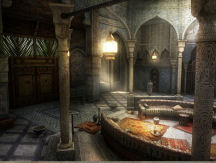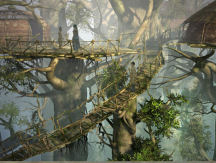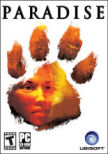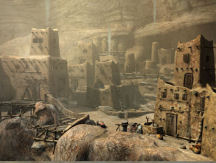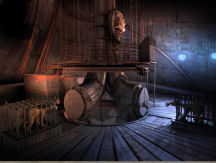Are there themes so controversial
that they can’t be part of the storyline of a game? Until playing
Paradise, I would have said: no way. Now I’m not so sure.
As suggested by the title, this game takes place in a
world rich in natural beauty. But the game is also partly about the urge
to create a social utopia, even if that leads to war. The game takes a
look at several groups of people affected by a war in paradise.
You assume the role of Ann Smith, a college student from
Geneva, Switzerland. Ann loses her memory after her plane is shot down in
the fictional African country of Maurania. The game is a journey into
self-discovery for Ann. It is also an illuminating exercise for the
gamer, who will find herself awed, discouraged, and outraged at different
points in the journey. Paradise dramatizes the will to power, the
consequences of obsessive love, the clash between the West and non-western
cultures, and the importance of blood (embracing it, denying it, spilling
it).
Can a deeply disturbing cultural commentary like
Paradise also function as a game?
Journey into Night
This is a third person point-and-click adventure, though
it jettisons point-and-click for three (optional) real time 3D sequences.
For the 3D sequences, when Ann is asleep or unconscious, you play as a
leopard that Ann is attempting to return to the wild. Does Ann have a
mystical connection with the leopard during these eerie night ramblings?
Paradise takes you into
unfamiliar worlds and exposes their peculiarities. You’ll explore a
primitive society where an odd phobia affects everyone’s daily lives.
You’ll try escaping from a palace in which the female inhabitants never
question their imprisonment. And you’ll wander through an underground
labyrinth where workers refuse to harvest the riches underfoot. The game
shows how the culture in each environment obstructs or aids Ann. In
addition, in certain locations Ann is a catalyst for change – often
unintentionally. Intriguingly, the game then leaves you to draw your own
conclusions about the events you’ve just witnessed.
It becomes apparent that Ann carries an extraordinary
ethical and personal burden. The information she has gathered about
herself and about Maurania will figure into the decision she must make
during the game’s culminating crisis.
Paradise -- NOT
Syberia in Africa
When I first read that Benoît Sokal was designing a new
adventure with a strong female protagonist -- and set in an exotic part of
the globe -- I naturally concluded that the game would be much like
Sokal’s previous games, Syberia and Syberia II. Though
Paradise does have some surface similarities to the Syberia
games, it is in fact substantially different and more ambitious.
Paradise is concerned with
societies and the relationships within them – its focus goes beyond the
plight of the mere individual. It compares poverty and wealth, technology
and magic, familial tenderness and ruthless revenge. Interactions in
Paradise are more complex then in Syberia, both with the
environment and with the characters. The game contains less humor
than Syberia, and the puzzles are more challenging.
South of Eden
The graphics in Paradise bring a palpable sense
of reality. The palette varies from warm earth tones in the outdoors
locations to cooler, muted hues indoors. The graphics are soft-edged and
often show the world from unusual angles. Exterior locations are full of
sinuous natural forms and lively detail including water effects,
raindrops, smoke, and fluttering butterflies. The uses of natural light
are masterly. While I understand the desire to vary the game locations
(some of which are underground), the garden and forest environments are so
breathtaking that I left them only grudgingly.
The figures in this game are slightly stylized.
Occasionally the characters are comical, but for the most part this is a
serious game. It creates a feeling of intimacy – by the time I had left
each location, I felt as though I knew the place well and understood the
people and their motivations.
Cutscenes amaze -- they are fluidly animated, with
striking colors, lighting, and camera angles.
A fascinating aspect of Paradise is the Mauranian
fauna. A book in the inventory describes these whimsical creatures. I
recommend that you read it before encountering each one. Again, I wish I
could have spent more time with the gazelines, the palmettes and the sand
dabs.
Purring like a Kitten
The sound in Paradise is another of its
strengths. Overall, the voice acting is excellent. The dialog sequences
are well written, with the exception of those in the Molgrave village,
where the locals speak a hideous hissing language in which the “s” sound
has hundreds of meanings. There are subtitles for the dialog and most
dialogs can be clicked through.
The volume of the music can be separately adjusted,
which is a wonderful feature. I found that I had to adjust the music
whenever there was a radio report. These reports contain important plot
exposition, but are not accompanied by subtitles.
Ambient sounds are suggestive rather than overwhelming.
The music adds to the game’s ambiance, though it can become repetitive.
The only place I thought the music intruded was an underground sequence
where the stirring, adrenaline pumping score only served to exacerbate a
tedious pixel hunt.
Which brings me to one of the game’s significant
weaknesses.
Hotspot Lost?
I found that unusual patience is required to locate many
of the in-game hotspots in Paradise. Some hotspots are well hidden
– either they blend in with the background, or they must be sought without
much clueing within a large, detailed environment.
That said, much of my initial difficulty in locating
hotspots was due to Paradise’s animated cursor. When placed near a
hotspot, the animated cursor will grow pincers (for picking up objects),
spikes (for using inventory items), a trumpet (for speaking to other
characters) or a magnifying glass (to examine things). This can be
problematic if you are the type of gamer who searches the screen rapidly –
you may move the cursor partway across the screen before the cursor
animation can end. I found that the cursor would flicker to signal a
hotspot, but then there would be nothing to interact with in that
particular spot. Unless I searched each screen in careful increments, the
animated cursor gave only a rough indication of where the hotspots were
located. The first time I played through the game, I found that hour
after hour of this patient searching became frustrating in the extreme.
Fortunately, Ubisoft has recently released a patch for
Paradise that addresses this problem. After applying the patch,
there is a feature in the Options menu that allows you to disable the
animated cursor. I recommend doing this, as it eliminates a goodly
portion (though not all) of the pixel hunting frustration in the game.
I thought that the gameplay in Paradise became
more fun in the final location where many of the puzzles are mechanical.
This eliminated much of the pixel hunting -- plus the mechanical puzzles
reward the gamer with beautiful cutscenes.
Challenges in Paradise also involve rather long
dialog trees that may trigger access to hotspots. Many of the challenges,
in fact, do rely on a trigger to advance the game -- so it’s important to
keep returning to locations you’ve already visited, and to keep trying
hotspots that don’t seem to function at first. Paradise contains
inventory application and combination puzzles, some of which require
multiple steps. The game also contains a handful of timed puzzles, most
of which are enjoyable and fairly easy. The timed puzzles sometimes
involve the movements of the exotic, imaginative creatures that populate
Maurania, and they add a lot to the fun factor.
Fleeing from Point A to Point A
An (unintended) challenge in Paradise is the
movement. Some of the locations (or rooms, as the manual calls them) are
panoramic and involve three or more screens, with directional arrows only
at the edges of the end screens. This means that there are no directional
arrows to be found in the middle screens, so there are stretches within
certain locations where you have to click and guess. Two additional
annoyances -- at times clicking on a directional arrow fails to move Ann
in the direction that the arrow seems to be pointing. And in a few
instances Ann faces the wrong way when entering a new screen, so you have
to turn her around in order to go forward. There aren’t any mazes in this
game, but there is an elaborate tree house environment with two different
levels and several bridges that seems maze-like.
Movement in the 3D sequences with the leopard is also
cumbersome, with the controls moving the leopard only approximately where
I wished him to go. The leopard sometimes became stuck within objects in
the environment, forcing me to move him back before I could move him
forward. Despite this, I very much enjoyed my time as a feline creature
of the wild, inhabiting an alien world of different colors and textures
and tempting distractions. (The leopard sequences are optional and can be
bypassed by hitting the Escape key.)
Spit and Polish
The main menu is smashingly stylish, reminiscent of an
old-fashioned steamer trunk as it snaps open. There’s an additional
surprise if you linger. The main menu allows you to replay cutscenes,
which I did over and over for their sheer beauty. Other pluses – the game
installed smoothly and it provides unlimited saves.
In contrast to the spiffy main menu and ease of
installation, I encountered many glitches in the game itself, though the
bulk of these were eliminated by the patch I mentioned above. The first
time I played Paradise, the game hung five times – each
time I had to exit to the desktop and restart from a previously saved
game. At one point, I gave an inventory item to the wrong person, and the
item then disappeared. This forced me to go back to a previous save and
replay. A couple of times inventory items were numbered rather than
labeled, and one document could not be read. All of these problems were
eliminated by the patch.
There was one glitch that the patch did not address. I
saved the game during a close-up of a bench, and when I returned to that
saved game, Ann had permanently disappeared and I couldn’t continue.
Unpatched, there is an oddity with the inventory that
gamers should be aware of. Each item collected in inventory can be picked
up by left-clicking with the “pickup” cursor. A few of the items can be
observed in detail – for this you must click on the magnifying glass at
the top of the inventory screen and then click on the item. However, if
you’re using “magnifying glass mode,” you can no longer pick items up, and
you must click again on the magnifying glass to return to the “pickup”
cursor. Once the patch is applied, though, the cursor automatically
returns to its “pickup” mode after you’ve used the “magnifying glass”
cursor.
The End is Where We Start From
Just as the game’s plot and character development are
thought-provoking without being directive or “preachy,” Paradise’s
end is emphatically ambiguous. I enjoyed the uncertainties in Ann’s final
sequence, though I did wish to find out more about the fate of the
leopard. Then again, the leopard’s story is so entwined with Ann’s own
destiny that consistency probably demands that his final moments should
also be left open to interpretation.
I’ll ask the question again – can a story that addresses
knotty social and ethical controversies also function as a game? The
answer before I applied the Paradise patch was a reluctant “no,”
because the game’s original execution created a frustrating gameplay
experience that detracted from the complex themes it was attempting to
explore. Playing Paradise with the patch – I’ll admit to a
tentative “yes.”
The game deftly portrays the unintended consequences of
seemingly logical actions. It forces the gamer to look closely at
culture, conflict, and the human tendency to deny reality when it suits
the situation. If you would like to sit down to a game that is striving
to break loose from the usual gaming plots and themes, Paradise is
a must-play.
Quick List for Paradise
Wonderful locations and graphics – unique flora and
fauna. Fantastic cutscenes. A realistic, thoughtful portrayal of various
cultures within a fictional African country, about which the gamer must
draw his own conclusions. The ending is ambiguous. There is no explicit
sexual or violent content, but both are implicit -- together with the
game’s mature themes they make this a game that should not be played by
children.
Third person perspective, point-and-click interface for
most of the game. You will play three brief sequences as the leopard,
during which the interface completely changes. These sequences can be
skipped if you choose – if you play them, reading the manual again will
help with the new controls.
Plenty of dialog, excellent voice acting. You cannot
die. Frustrating pixel hunts, some cumbersome movement because of
inadequate directional arrows. Inventory and mechanical puzzles. A few
easy timed puzzles. No mazes, though one location can be maze-like. No
sliding tile puzzles, no sound matching puzzles. One puzzle seems to
require color discrimination, but can be solved without it. Overall
difficulty level: with the animated cursor – high; after disabling the
animated cursor -- moderate.
No problems with installation. Unlimited save slots.
Without the patch, the game hung five times, requiring a
return to the desktop. The patch eliminated these problems. It did not
eliminate one glitch that necessitated starting again from a previously
saved game. It resolved inventory system oddities, added cutscenes, added
the ability to disable the animated cursor, and eliminated some
consistency problems. You can apply the patch even if you are already
partway through the game – it will not erase previously saved games.
Overall, the patch improved my gameplay experience considerably – you can
download it
here.
Paradise is aimed at gamers
who enjoy character driven games involving a quest for self-knowledge,
controversial issues, and varied, spectacular scenery.
This is a difficult game to grade. The gameplay
experience after applying the patch was radically different than that in
the original playthrough. It is unfortunate that the improvements and
enhancements contained in the patch were not available at the time that
the game was released.
Final Grade:
Before the
patch: C+
After the
patch: B+
My Computer Specs:
Windows XP Professional
Pentium 2.80 GHz
2046 MB RAM
Direct X 9.0c
512 MB NVIDIA GeForce 7800 GTX
SB X-Fi Audio
06-2006
design copyright ©
2006
GameBoomers
Group
